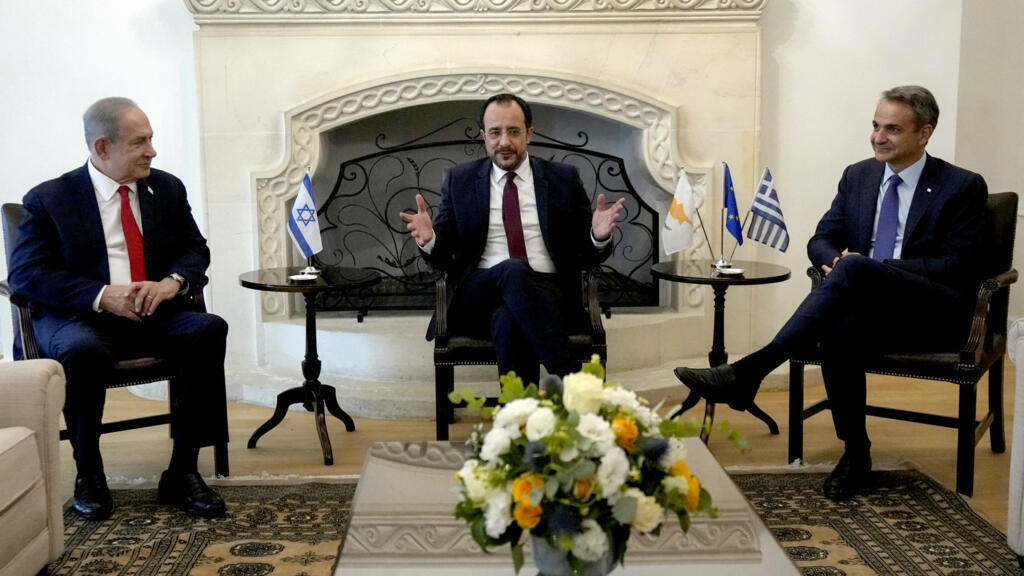Israel talks defence with Greece and Cyprus, as Turkey issues Netanyahu warrant
Issued on:
Israeli-Turkish relations were dealt another blow when a Turkish court issued an arrest warrant on genocide charges against Israeli Prime Minister Benjamin Netanyahu and other senior officials, a move strongly condemned by Israel.

As bilateral relations deteriorate, Israel is stepping up defence cooperation with Turkey's rivals, Greece and the Republic of Cyprus. Turkey has ongoing territorial disputes with both – over maritime and airspace rights in the Aegean Sea, and the division of Cyprus following Turkey's 1974 invasion of the island. The Turkish Republic of Northern Cyprus in the north of the island is recognised only by Turkey.
Israeli Diaspora Minister Amichai Chikli claims Israel's deepening partnerships with Athens and Nicosia is aimed at countering the growing threat posed by the Turkish president, Recep Tayyip Erdogan.
"The doctrine of Erdogan is extremely dangerous. It's extremely dangerous for Israel, and we see Erdogan's Turkey as the new Iran, nothing less. It's very dangerous for Cyprus and it's very dangerous for Greece," said Chikli.
This month, Israeli and Greek warships held joint military exercises in the Eastern Mediterranean. The drill followed similar exercises by the country's air forces.
While Ankara played a key role in bringing about a ceasefire in the Gaza war, tensions have continued.
"We saw Turkey issuing arrest warrants against 37 high-level Israelis, but I think it also relates to the fact that the ceasefire is fragile. We are not entirely sure we are moving in a positive direction," said Gallia Lindenstrauss, an Israeli foreign policy specialist at the Institute for National Security Studies in Tel Aviv.
Turkey ready to help rebuild Gaza, but tensions with Israel could be a barrier
Defence talks
However, Lindenstrauss claims the Gaza ceasefire has opened the door to an acceleration in deepening cooperation with Greece.
"We see the ceasefire is definitely seen as the green light to proceed in cooperation. We see defence deals... serious defence deals are being discussed," she added.
Israeli ministers visited Athens this month for defence talks. Israel has already sold Greece and Cyprus some of its most sophisticated weapons systems, causing alarm in Ankara.
"We see an alignment of the Greek, Greek Cypriot [sic] and Israeli navies. One cannot deny the risk that this will embolden them [Greece and Cyprus]... with Israeli support,” said international relations professor Serhat Guvenc, of Istanbul's Kadir Has University.
Cyprus could become an increasingly focal point for Turkish-Israeli rivalries, given its strategic location. The United Kingdom has two military bases on the island, with the United States having a presence on these. Turkey, meanwhile, has an air base in the soi-disant Turkish Republic of Northern Cyprus.
"The island is like a static aircraft carrier; it can dominate the whole of the Middle East and Turkey as well," warns former Erdogan advisor Ilnur Cevik, who is now a journalist.
"A fighter plane that lifts off from Cyprus can get to Ankara in 15 minutes maximum. Turkey wants the island to be a security zone for itself. Plus, the Turks have even thought about setting up a new naval and airbase."
Turkey and Egypt's joint naval drill signals shifting Eastern Med alliances
Turkey's recent purchases of Eurofighter jets, along with a missile development programme encompassing hypersonic and ballistic capabilities, are also fuelling Israeli concerns.
"It's not clear why a status quo actor should have such a missile programme," said Israeli analyst Lindenstrauss.
"For example, Israel doesn't have a missile programme despite the many threats it faces. I think middle and long-range missiles do suggest this is something more related to offensive intentions... I think all actors that have tense relations with Turkey are watching these developments," she added.
Turkish Cypriot vote could force shift in Erdogan’s approach to divided island
US influence
US Ambassador to Turkey Tom Barrack sought to downplay tensions, dismissing any threat of conflict between Turkey and Israel.
“Turkey and Israel will not be at war with each other. In my opinion, it’s not going to happen. And you are going to get alignment from the Caspian Sea to the Mediterranean," he said, speaking at the International Institute for Strategic Studies Manama Dialogue, a Middle East security forum, on 1 November.
US President Donald Trump, who retains powerful influence over both governments, regional analysts suggest, could play a key role in managing, if not resolving tensions, given his goal of bringing peace and stability to the region.
"[Washington] are very concerned. This is a topic that gets a lot of people's attention. The United States has certainly been trying to mediate and sort of bring tensions down,” said Asli Aydintasbas of the Washington-based Brookings Institution think tank.
Guvenc doesn't rule out a reset in regional relations, but warns that for now the region remains in the grip of an escalating arms race, fuelilng further mistrust and the risky strategy of "my enemy's enemy is my friend".
"We have partnerships – alliances of convenience, pragmatic, tactically motivated alliances – but you never know. I mean, Turkey and Israel may mend fences, and this may create a totally different strategic, regional geopolitics than the one we are talking about today. So everything is in flux, and the balances and the alliances may shift in a very short time."
Daily newsletterReceive essential international news every morning
Subscribe